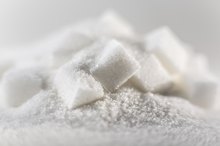Cramps Due to Sugar Intake
Consumption of sugar or its substitutes may be contributing to stomach cramps in some people, depending on other underlying conditions. Many people eat more sugar than the recommended daily amount, much of it coming from processed foods with added sugar. Try to limit these foods in your diet, favoring naturally sweet foods like fresh fruit instead.
Menstrual Disorders
About half of all menstruating women have a condition called primary dysmenorrhea, or painful cramping during menstruation. Although sugar intake is not a cause of this condition, making dietary changes, including reducing your sugar intake, can help ease cramps.
Lactose Intolerance
The Process of Breaking Down Sugar
Learn More
Lactose is a form of sugar present in dairy products. If you experience cramps, bloating, gas and diarrhea after drinking milk or eating cheese, see a doctor to have lactose intolerance accurately diagnosed 1. Treat the condition by avoiding dairy products, consuming lactose-free milk or taking a lactase enzyme supplement before eating dairy to help you better digest lactose.
- Lactose is a form of sugar present in dairy products.
- If you experience cramps, bloating, gas and diarrhea after drinking milk or eating cheese, see a doctor to have lactose intolerance accurately diagnosed 1.
Sugar and Exercise
If you're an athlete, avoid the temptation to "carbo-load" with sugary foods before a big race or game. Foods with high sugar concentration can draw fluid into your gastrointestinal tract, leading to cramping, nausea, dehydration and diarrhea during exercise. Make your pre-workout meal healthy, and consume it one and a half to two hours before the event. Stay hydrated with water and avoid caffeine; you can also save sports drinks and other electrolyte-replacing beverages until after the event.
- If you're an athlete, avoid the temptation to "carbo-load" with sugary foods before a big race or game.
Sugar Alcohols
Yogurt Granola Parfait Calories
Learn More
Cutting down on your sugar consumption can have unintended consequences if you're replacing the sugar with artificial sweeteners. Sugar substitutes such as erythritol, maltitol, lactitol, mannitol, xylitol and sorbitol, also known as sugar alcohols, can cause:
- diarrhea
- cramping in people who are sensitive to them
If you get cramps after eating a "sugar-free" treat or chewing sugarless gum, try limiting your intake of these items.
Related Articles
References
- KidsHealth.org: Lactose Intolerance
- Rippe JM, Angelopoulos TJ. Sucrose, High-Fructose Corn Syrup, and Fructose, Their Metabolism and Potential Health Effects: What Do We Really Know? Adv Nutr. 2013;4(2):236-245. doi:10.3945/an.112.002824
- U.S. Department of Agriculture. Cut Down on Added Sugars. 2016.
- Rampersaud GC, Kim H, Gao Z, House LA. Knowledge, perceptions, and behaviors of adults concerning nonalcoholic beverages suggest some lack of comprehension related to sugars. Nutr Res. 2014;34(2):134-142. doi:10.1016/j.nutres.2013.11.004
- Tandel KR. Sugar substitutes: Health controversy over perceived benefits. J Pharmacol Pharmacother. 2011;2(4):236-243. doi:10.4103/0976-500X.85936
- Bray GA. Energy and Fructose From Beverages Sweetened With Sugar or High-Fructose Corn Syrup Pose a Health Risk for Some People. Adv Nutr. 2013;4(2):220-225. doi:10.3945/an.112.002816
- American Dental Association. American Dental Association Encouraged by Soda Makers’ Pledge to Promote Smaller Sizes, Less Sugar. 2014.
- U.S. Department of Health and Human Services and U.S. Department of Agriculture. 2015–2020 Dietary Guidelines for Americans. 8th Edition. 2015.
Writer Bio
Sarah Barnes has been a professional writer and editor since 2004. She has been published in newspapers and regional magazines in the Wichita, Kansas area. Barnes holds a Bachelor of Arts in journalism from a Midwestern university.









